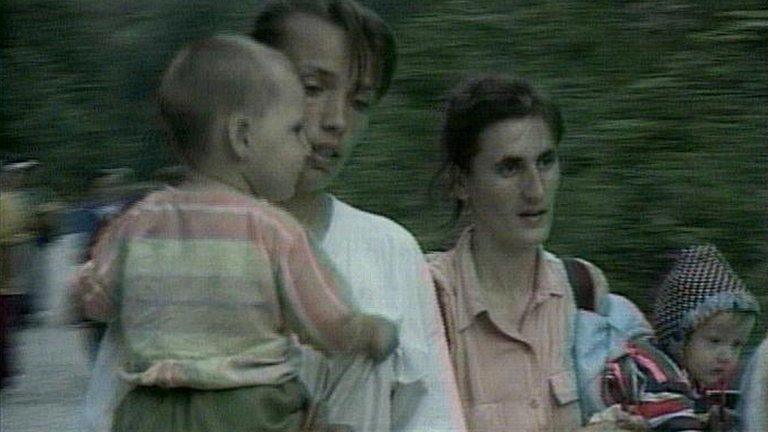Srebrenica massacre anniversary: Crowds chase Serb PM away
- Published
One of his colleagues told the Associated Press that Serbian Prime Minister Aleksandar Vucic was hit in the face by a stone and his glasses were broken
Serbia's PM Aleksandar Vucic has been chased away by stone-throwing protesters from a ceremony marking the 20th anniversary of the Srebrenica massacre in Bosnia-Herzegovina.
About 8,000 Bosnian Muslim men and boys died at the hands of Bosnian Serb forces amid the break-up of Yugoslavia.
Serbia backed the Bosnian Serbs and Mr Vucic was praised for attending the event.
The Serbian foreign ministry has now issued a formal protest note to Bosnia.
Speaking in Belgrade after the attack, Mr Vucic urged Serbs not to show hatred towards Bosnian Muslims, adding he wanted friendly ties.
"My hand remains outstretched and I will continue with my policy of reconciliation," he added.
Serbia's interior minister, Nebojsa Stefanovic, said: "This is a scandalous attack and I can say it can be seen as an assassination attempt."
Bosnia's main Muslim SDA party said the attackers had "embarrassed Bosniaks (Bosnian Muslims)", in a statement quoted by FENA news agency.
The Bosnian War saw Bosnian Serb forces, backed by Serbia, fighting the Muslim-led Bosnian government.
In July 1995, thousands seeking shelter in what was supposed to be a UN refuge in Srebrenica were shot dead. It was Europe's worst atrocity since World War Two.
The Bosniak people, most of whom are Muslims, are descended from Bosnian Slavs who adopted Islam under Ottoman Turkish rule in the Middle Ages.
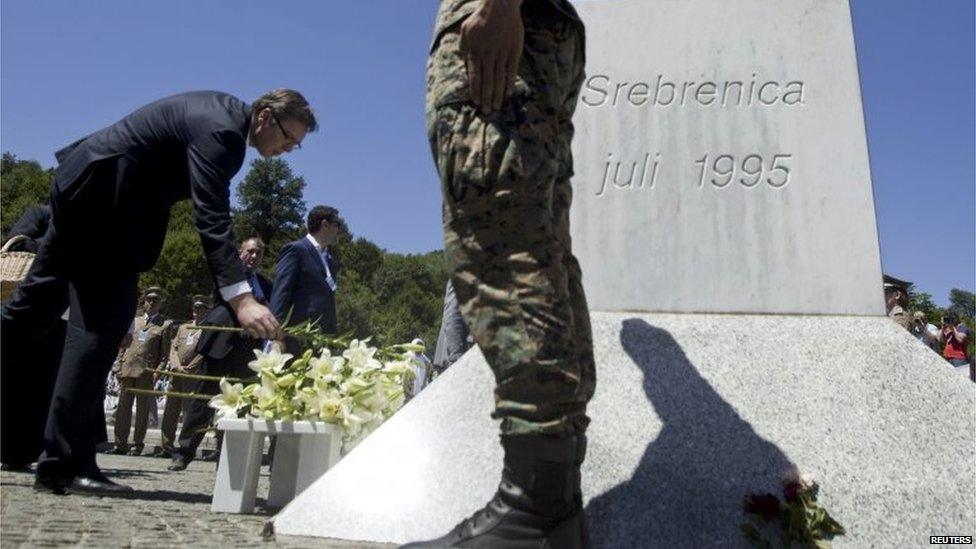
Prime Minister Vucic placed flowers at the memorial to the victims before booing started
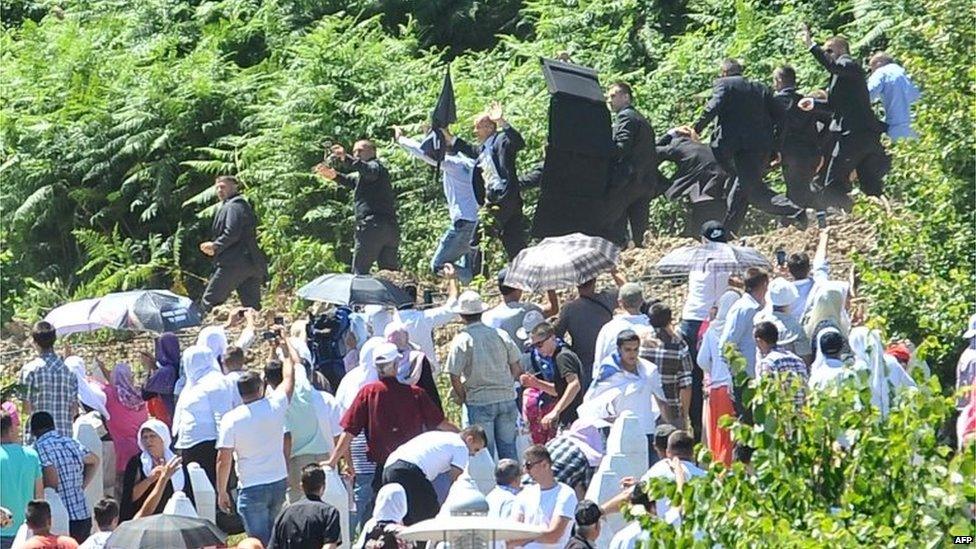
Mr Vucic and his delegation scrambled to their cars after the attack with bodyguards using bullet-proof shields
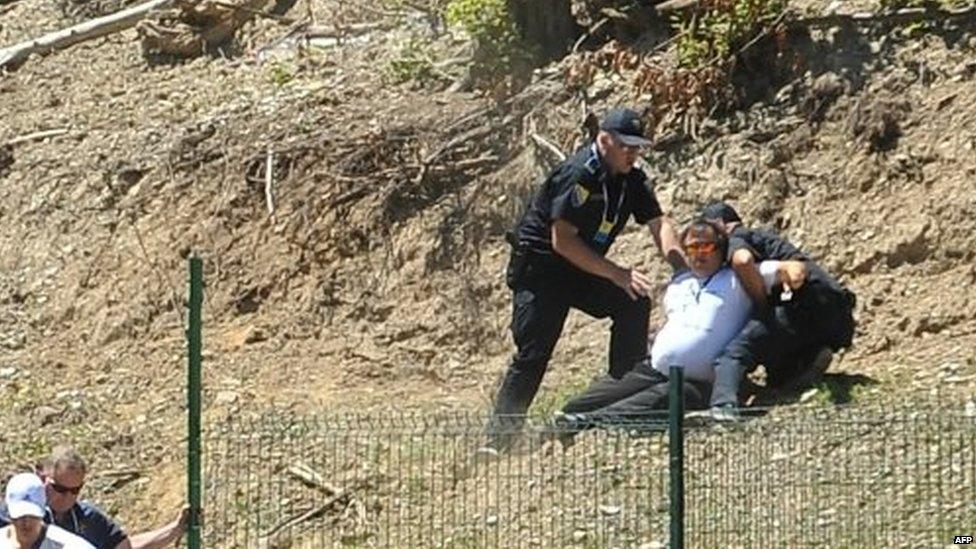
Bosnian police officers arrest a protester suspected of having taken part in the attack on Mr Vucic
Mr Vucic is a former radical Serb nationalist who served under Serbian leader Slobodan Milosevic in the late 1990s.
He is now a pro-Western politician seeking to steer Serbia into the European Union. His government managed to secure support from its ally Russia on Wednesday to veto a UN resolution calling the events in Srebrenica a genocide.
Upon arriving in Srebrenica, he published an open letter which did not use the word genocide but said: "Serbia clearly and unambiguously condemns this horrible crime and is disgusted with all those who took part in it and will continue to bring them to justice."
A funeral service for more than 100 victims whose remains were recently identified using DNA analysis was also held on Saturday.
Attending the ceremonies, Bill Clinton, the US president at the time, apologised that it had taken so long to end the war, adding: "I never want to see another killing field like this."

At the scene: Guy Delauney, BBC News, Potocari, Srebrenica
The commemoration provided a perfect illustration of just how difficult reconciliation can be - in Bosnia and across the region.
Tens of thousands of people came to pay their respects to the victims of Srebrenica and show their solidarity with the people of this much-diminished town. They heard international dignitaries speak of the horror of what had occurred here and how it must never be repeated.
Then former US President Bill Clinton made a specific point of praising the courage of Serbian Prime Minister Aleksandar Vucic for turning up in the face of hostility from many ethnic-Bosniaks. They are angry that while Serbia has condemned the massacre, it has never used the word genocide to describe what happened.
Sadly, but predictably, Mr Vucic was loudly jeered by many in the crowd. Some even threw objects as he paid his respects in the cemetery. The imam reminded the crowd that it was time to pray. But the anger here remains.

Mr Clinton praised Mr Vucic for being there.
However, later the Serbian leader was heckled by crowds shouting "Allahu Akbar" as he entered to lay flowers.
As some chanted "responsibility" and "genocide", others proceeded to throw objects - reports suggested stones, water bottles and a shoe were among the items used.
One hit Mr Vucic on the lip and his glasses fell to the ground as the delegation scrambled away and were broken.
Srebrenica Mayor Camil Durakovic said the attack was "the work of sick minds who abused this solemn event".
Munira Subasic, head of the Association of Srebrenica Mothers said she was "terribly disappointed" by the scenes.
"They killed my progeny... I don't have a future anymore"
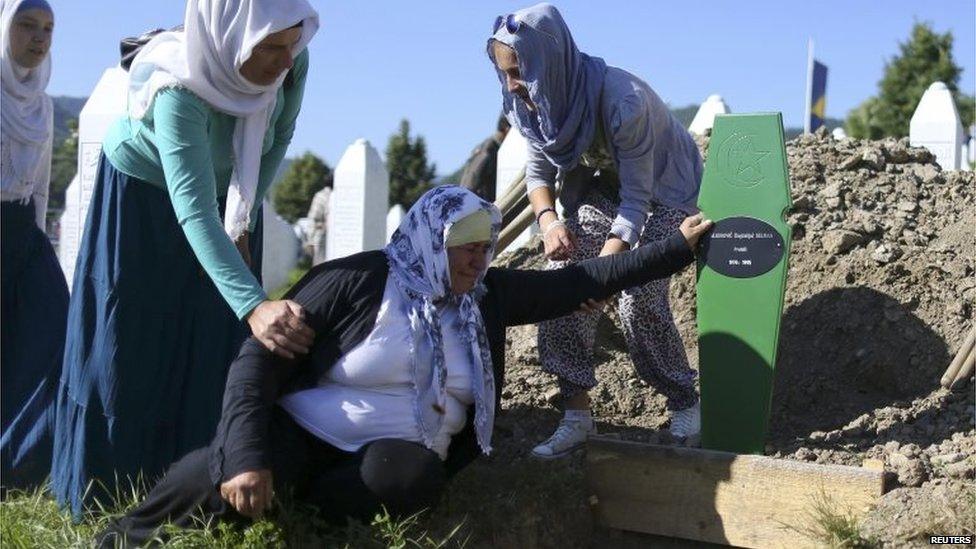
The wounds of the atrocities are still raw in Bosnia
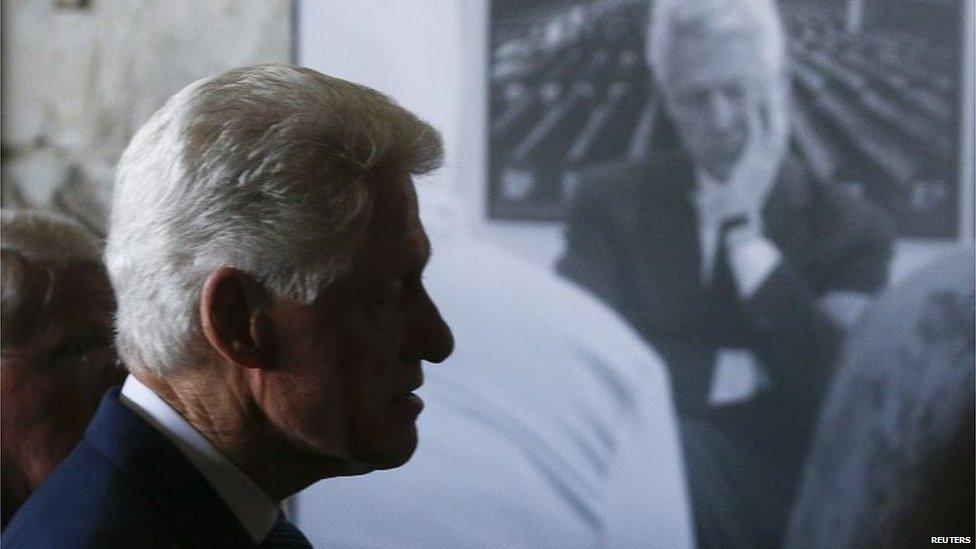
Bill Clinton was president at the time - he apologised it had taken so long to bring the war to an end
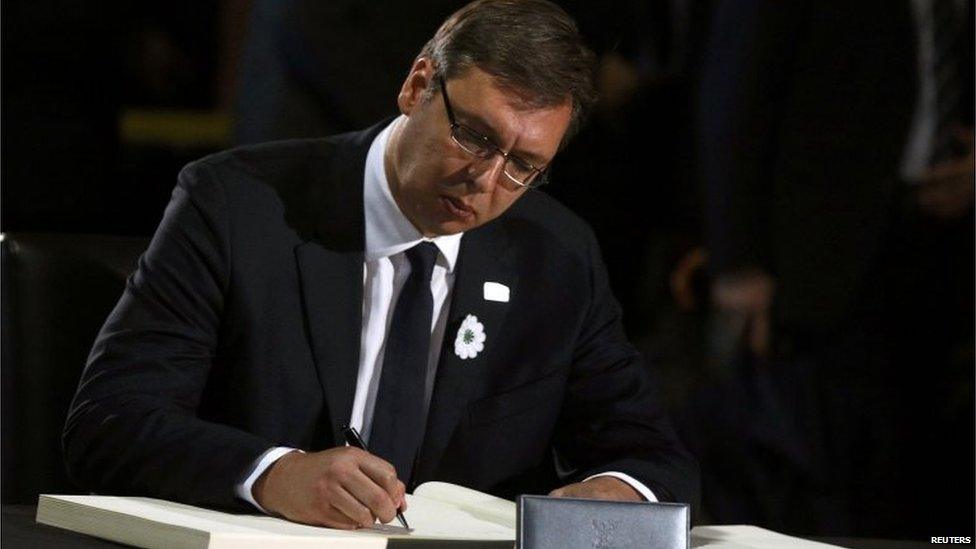
Vucic condemned the Srebrenica massacre as a "horrible crime"
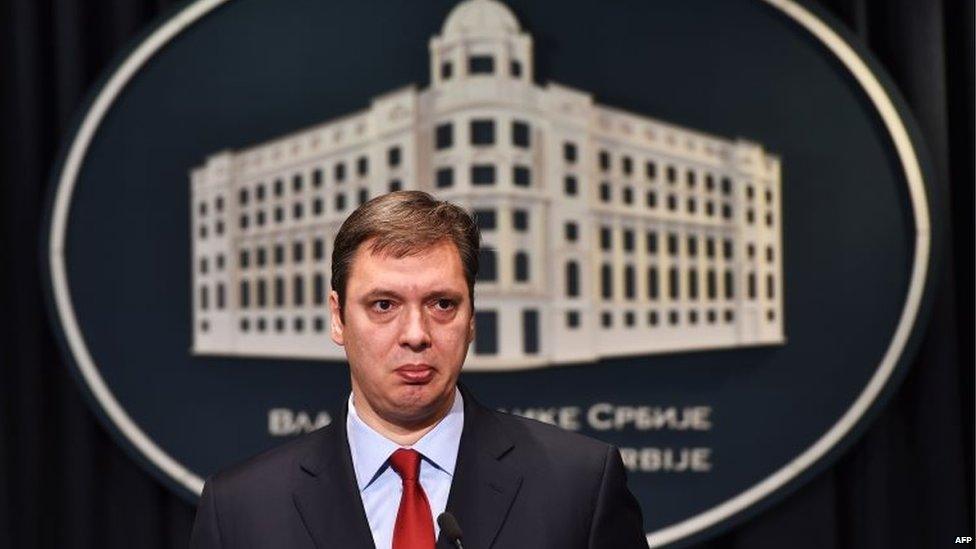
In Belgrade without his glasses, Mr Vucic extended the hand of friendship to the Bosnian Muslims
Fourteen individuals have been convicted at the UN's International Criminal Tribunal for the Former Yugoslavia (ICTY) in The Hague in relation to the Srebrenica killings.
The former Bosnian Serb army chief, Ratko Mladic, and former Bosnian Serb leader Radovan Karadzic are both on trial at The Hague in separate processes.
They are both accused of crimes relating to the massacre.
The ICTY - and the International Court of Justice - have called the events genocide.

Guy Delauney reports from Srebrenica 20 years after the massacre
Timeline of Srebrenica siege
6-8 July 1995: Bosnian Serb forces start shelling Srebrenica enclave
9 July: Bosnian Serbs step up shelling; thousands of Bosnian Muslim refugees flee to Srebrenica
10 July: Dutch peacekeepers request UN air support after Bosnian Serbs shell Dutch positions. Large crowds of refugees gather around Dutch positions
11 July: More than 20,000 refugees flee to main Dutch base at Potocari. Serbs threaten to kill Dutch hostages and shell refugees after Dutch F-16 fighters bomb Serb positions. Bosnian Serb commander Ratko Mladic enters Srebrenica and delivers ultimatum that Muslims must hand over weapons
12 July: An estimated 23,000 women and children are deported to Muslim territory; men aged 12-77 taken "for interrogation" and held in trucks and warehouses
13 July: First killings of unarmed Muslims take place near village of Kravica. Peacekeepers hand over some 5,000 Muslims sheltering at Dutch base in exchange for the release of 14 Dutch peacekeepers held by Bosnian Serbs
14 July: Reports of massacres start to emerge

- Published11 July 2015
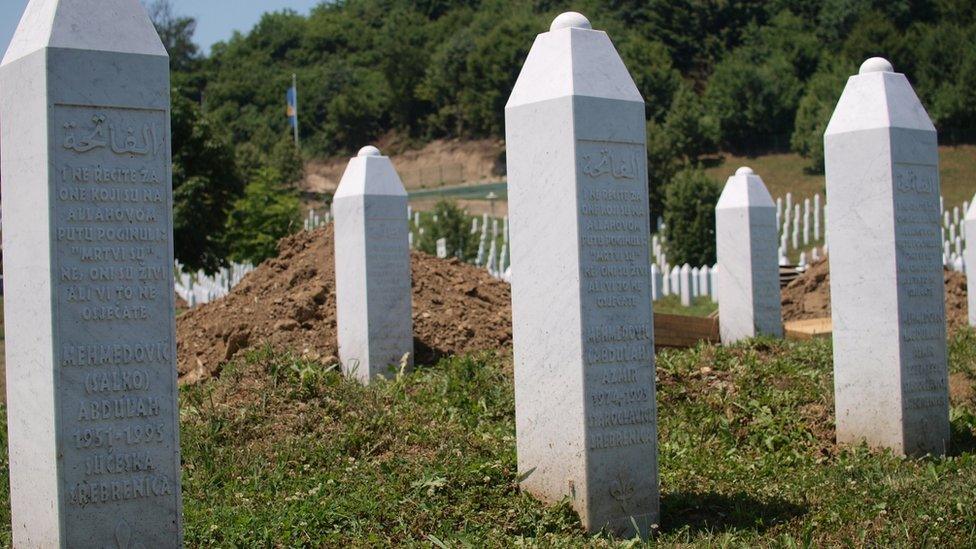
- Published11 July 2015
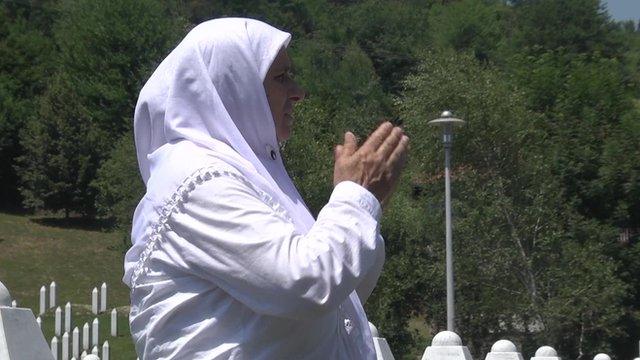
- Published9 July 2015
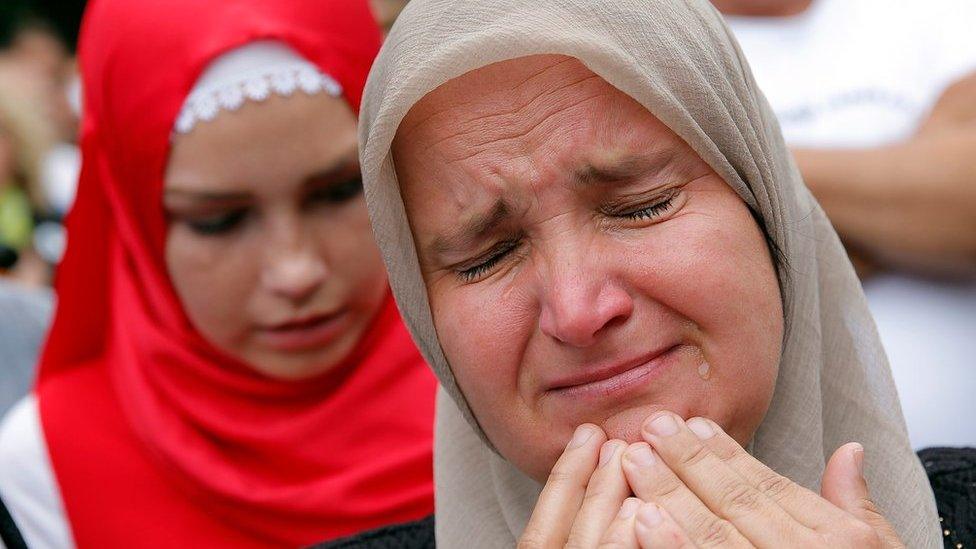
- Published8 July 2015
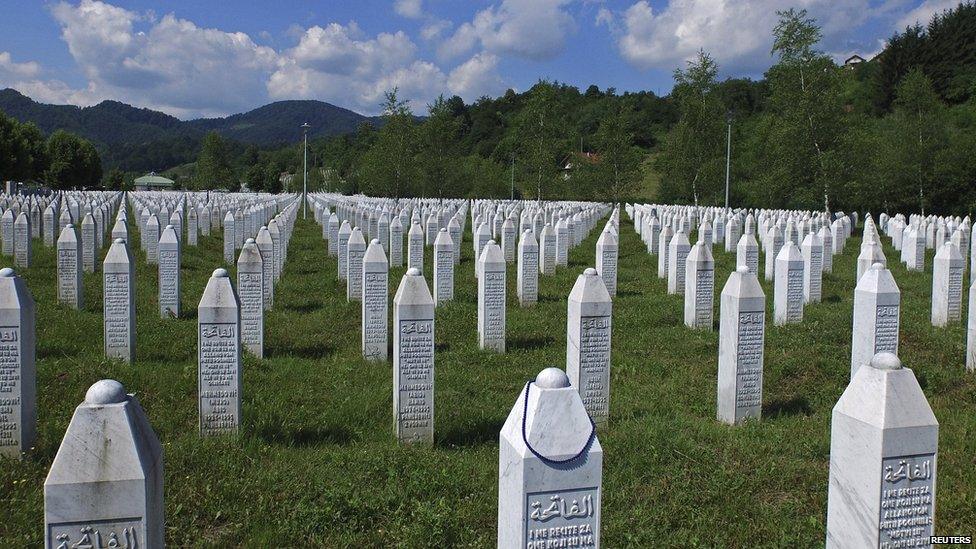
- Published17 May 2012
